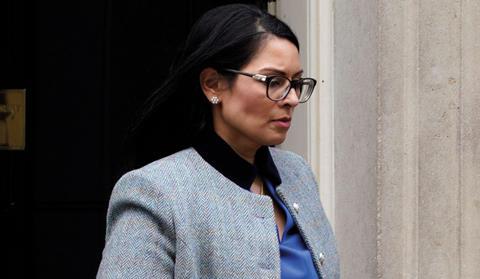Surely there must be some good news for your first column after the summer break, the editor said hopefully. I thought hard.

‘How about,’ he suggested, ‘the presumption against prosecution in the government’s Overseas Operations (Service Personnel and Veterans) Bill?’
‘You mean the one that would set a five-year time limit for prosecutions of serving or former members of the armed forces?’ Yes, he replied, ‘the one that makes it less likely they’ll be prosecuted for crimes committed during overseas operations’.
That’s good news for individual soldiers, I conceded. But the Equality and Human Rights Commission said it would allow troops guilty of crimes such as torture to escape justice.
‘Yes, but that’s a Ministry of Defence bill,’ the editor reminded me. ‘There are other government departments.’
Like the Home Office – whose Twitter feed claimed that current immigration regulations were ‘rigid and open to abuse allowing activist lawyers to delay and disrupt returns’?
‘But at least the permanent secretary deleted the video and agreed that the phrase “activist lawyer” should not have been used on an official government channel,’ the editor replied. ‘As we reported at the time. I was thinking more about the attorney general. Hasn’t Suella Braverman QC been sticking up for bereaved families?’

‘You mean asking the Court of Appeal to look at the sentences passed on the killers of PC Andrew Harper?’ Henry Long, 19, who admitted manslaughter, was sentenced to 16 years’ imprisonment. Albert Bowers and Jessie Cole, both 18, were sentenced to 13 years in prison for the same offence.
Braverman had indeed regarded those sentences as unduly lenient. As she said in her press release, that meant she thought Mr Justice Edis, who is to join the Court of Appeal himself in January, ‘made a gross error or imposed a sentence outside the range of reasonable sentences available’.
That struck me as unlikely. If Long had not pleaded guilty, he would have got 24 years. And if the jury had convicted him of murder or if he had been 21 at the time of the offence, he would probably have received a whole-life order. But I didn’t think the appeal judges would be very interested in Braverman’s opinion that people who attack emergency workers ‘should be punished with the greatest severity for such heinous crimes’. They are more likely to think that criminals should be punished in accordance with the law.
‘Actually,’ the editor said a trifle impatiently, ‘I was thinking of the news that Braverman thought that Anne Sacoolas, who’s accused of causing the death of Harry Dunn by dangerous driving, should be tried “virtually or in absentia” – given that she’s refusing to return to the UK.’
That struck me as very curious. A defendant must be present at the start of the trial in order to plead. The Criminal Procedure Rules say a trial may not proceed in the defendant’s absence unless the judge is satisfied that it will be fair. How could the US government agree to a virtual trial for someone they say has diplomatic immunity? These were not questions the attorney’s office could answer.
‘What about the lord chancellor?’ asked the editor. ‘Surely Robert Buckland has some good news?’
‘Far from it,’ I replied. The chief executive of HM Courts & Tribunals Service has become acting permanent secretary at the Department for Education, where she used to work. Whatever you may think about the state of the courts, there’s no doubt that Susan Acland-Hood is a highly competent senior civil servant. Education needs her. The chances of her returning to a post she was in for nearly four years must be remote.
‘But Buckland had finally got his review of judicial review under way,’ the editor pointed out. ‘It’s chaired by Lord Faulks QC, the former justice minister who believes that the Supreme Court’s “assertion of judicial power” in the prorogation case – Miller No 2 – “cannot be justified by constitutional law or principle”.’
The editor is always right, even when he’s only a literary device. But don’t forget that Faulks resigned in 2016 when Liz Truss was appointed justice secretary. He correctly predicted that she would not have the clout to stand up to Theresa May on behalf of the judges. And nobody on Faulks’s review panel strikes me as a pushover either.
‘Nothing to raise a smile, then?’ Only a few moments more and the editor would be disappearing back to the real world.
How about Eleanor Sharpston QC, the advocate general at the EU Court of Justice who is suing the EU and her own judicial colleagues for trying to sack her? It turns out that the judges and their advisers haven’t put a foot right. If that’s the best the EU can do, we really are better off out.
‘That’s really funny,’ the editor replied.
joshua@rozenberg.net































No comments yet